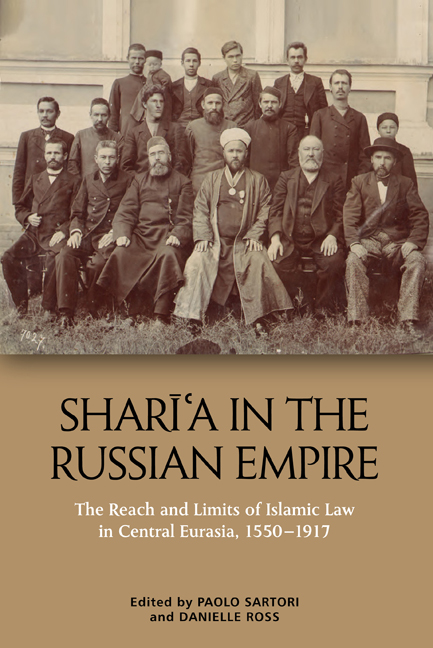Book contents
- Frontmatter
- Contents
- List of Contributors
- Introduction: The Reach and Limits of Sharīʿa in the Russian Empire, c.1552–1917
- 1 Islamic Education for All: Technological Change, Popular Literacy and the Transformation of the Volga-Ural Madrasa, 1650s–1910s
- 2 Taqlīd and Discontinuity: The Transformation of Islamic Legal Authority in the Volga-Ural Region
- 3 Debunking the ‘Unfortunate Girl’ Paradigm: Volga-Ural Muslim Women’s Knowledge Culture and its Transformation across the Long Nineteenth Century
- 4 Between Imperial Law and Islamic Law: Muslim Subjects and the Legality of Remarriage in Nineteenth-century Russia
- 5 Islamic Scholars among the Kereys of Northern Kazakhstan, 1680–1850
- 6 Tinkering with Codification in the Kazakh Steppe: ʿĀdat and Sharīʿa in the Work of Efim Osmolovskii
- 7 Taqlīd and Ijtihād over the Centuries: The Debates on Islamic Legal Theory in Daghestan, 1700s–1920s
- 8 Kunta Ḥājjī and the Stolen Horse
- 9 What We Talk about When We Talk about Taqlīd in Russian Central Asia
- 10 Take Me to Khiva: Sharīʿa as Governance in the Oasis of Khorezm (Nineteenth Century–Early Twentieth)
- Index
Introduction: The Reach and Limits of Sharīʿa in the Russian Empire, c.1552–1917
Published online by Cambridge University Press: 22 September 2020
- Frontmatter
- Contents
- List of Contributors
- Introduction: The Reach and Limits of Sharīʿa in the Russian Empire, c.1552–1917
- 1 Islamic Education for All: Technological Change, Popular Literacy and the Transformation of the Volga-Ural Madrasa, 1650s–1910s
- 2 Taqlīd and Discontinuity: The Transformation of Islamic Legal Authority in the Volga-Ural Region
- 3 Debunking the ‘Unfortunate Girl’ Paradigm: Volga-Ural Muslim Women’s Knowledge Culture and its Transformation across the Long Nineteenth Century
- 4 Between Imperial Law and Islamic Law: Muslim Subjects and the Legality of Remarriage in Nineteenth-century Russia
- 5 Islamic Scholars among the Kereys of Northern Kazakhstan, 1680–1850
- 6 Tinkering with Codification in the Kazakh Steppe: ʿĀdat and Sharīʿa in the Work of Efim Osmolovskii
- 7 Taqlīd and Ijtihād over the Centuries: The Debates on Islamic Legal Theory in Daghestan, 1700s–1920s
- 8 Kunta Ḥājjī and the Stolen Horse
- 9 What We Talk about When We Talk about Taqlīd in Russian Central Asia
- 10 Take Me to Khiva: Sharīʿa as Governance in the Oasis of Khorezm (Nineteenth Century–Early Twentieth)
- Index
Summary
Why a History of Islamic Law in Russia?
When it comes to writing the history of Islamic law from the 1600s to the early 1900s, Russia is, perhaps, not the first state to come to mind. As of 1897, the Russian Empire's Muslim population, numbered at about 13.9 million or 11.7 per cent of Russian subjects, appears small when compared to the British Empire's approximately 62.8 million Muslims. However, Russia's Muslim population was, in fact, not much smaller than that of the neighbouring Ottoman Empire, which was about 15.5 million in 1906. Some early twentieth-century observers noted, furthermore, that Tsarist Russia's sphere of unmediated influence over the Islamic ecumene transcended the boundaries of the empire and expanded well into the neighbouring regions of Iran and western China. Thus, the number of Muslims who experienced some form of Russian administration may have been as high as 25 million. This larger figure suggests that, in numerical terms, Russia's influence over the Muslim world in the late 1800s and early 1900s was roughly on par with that of the Dutch Empire, which boasted a Muslim population of about 30 million in Southeast Asia by 1905. To compare Muslim communities numerically may be regarded as a rather dry statistical exercise. However, it is precisely when one considers comparatively the size of the Muslim community inhabiting the Russian Empire that one begins to realise that Russia was one of the major imperial and colonial forces that profoundly shaped the Muslim world in early modern and modern history, a process of transformation that continues to affect Muslim societies today.
Nor could imperial Russia's Muslim population be characterised as marginal to the greater Islamic world. Embracing diverse communities ranging from the Volga river basin, the Ural Mountains, and Siberia to the Kazakh Steppe, Central Asia, Crimea and the Caucasus, imperial Russia's Muslims stood at the confluence of multiple cultures and political spheres. They occupied the central and northern sections of what once was the Mongol Empire, from which they inherited specific forms of governance and cultural practices. The cultures of the khanates of Kazan, Astrakhan, Siberia and Qasim, as well as the Kazakh khanate, all emerged from the fragmentation of the Golden Horde, and their history (considered either separately or collectively) offer numerous examples of traditions that can be traced back to the Mongol period.
- Type
- Chapter
- Information
- Shari'a in the Russian EmpireThe Reach and Limits of Islamic Law in Central Eurasia, 1550-1917, pp. 1 - 37Publisher: Edinburgh University PressPrint publication year: 2020



